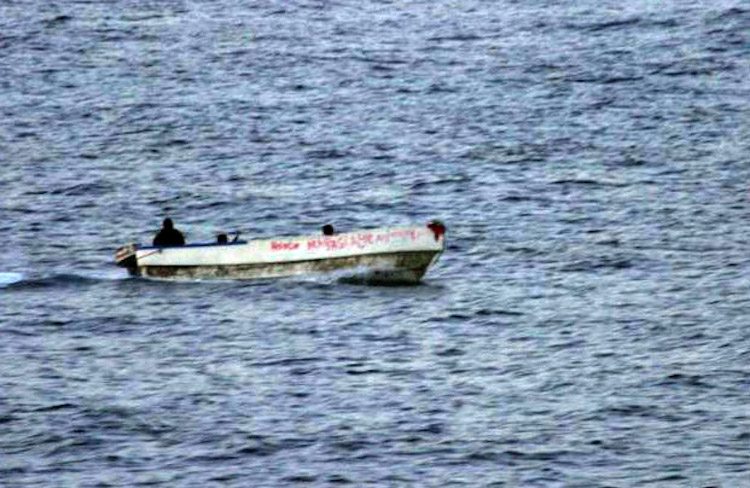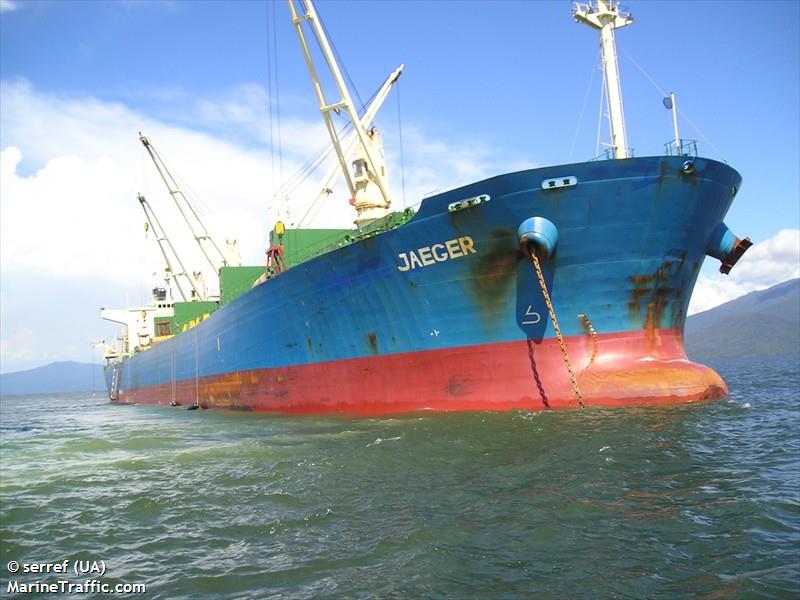Suspected pirate in international waters off the coast of Somalia. U.S. Navy File Photo
 By Fergus Jensen and Kanupriya Kapoor
By Fergus Jensen and Kanupriya Kapoor
JAKARTA, April 21 (Reuters) – Indonesia fears piracy on a shipping route along its sea border with the Philippines could reach Somalian levels and has told vessels to avoid danger areas, officials said on Thursday, after a spate of kidnappings.
Analysts say the route carries $40 billion worth of cargo each year. It is taken by fully laden supertankers from the Indian Ocean that cannot use the crowded Malacca Strait.
Concerns over maritime attacks by suspected Islamist militants are disrupting the coal trade, with at least two Indonesian coal ports suspending shipments to the Philippines.
Up to 18 Indonesians and Malaysians have been kidnapped in three attacks on tugboats in Philippine waters by groups suspected of ties to the Abu Sayyaf militant network.
Abu Sayyaf, which has posted videos on social media pledging allegiance to Islamic State militants in Iraq and Syria, has demanded 50 million pesos ($1.1 million) to free the Indonesian crew.
“We don’t want to see this become a new Somalia,” Indonesian chief security minister Luhut Pandjaitan told reporters, referring to the southern Philippine waters of the Sulu Sea, where the abductions took place.
Piracy near Somalia’s coast has subsided in the last few years, mainly due to shipping firms hiring private security details and the presence of international warships.
The foreign ministers of Indonesia, Malaysia and the Philippines will meet in Jakarta to discuss the possibility of joint patrols, Pandjaitan said.
He said the armed forces chiefs of the three countries would hold talks in Jakarta on May 3.
The Indonesian Navy has instructed all commercial vessels “to avoid piracy-prone waters around the southern Philippines,” a spokesman for the Indonesian military said.
The navy is increasing patrols around Indonesia’s borders with Malaysia and the Philippines “to prevent acts of piracy and hijacking,” Tatang Sulaiman told Reuters.
The Kuala Lumpur-based Piracy Reporting Centre has also warned ships sailing in the Celebes Sea and northeast of the Malaysian state of Sabah on the island of Borneo to stay clear of suspicious small vessels.
COAL TRADE HIT
Two Indonesian coal ports have blocked departures of ships for the Philippines and more suspensions are expected, said Pandu Sjahrir, chairman of the Indonesian Coal Mining Association, and a director of Jakarta-listed coal producer Toba Bara Sejahtera.
Toba had suspended all shipments to the Philippines, Sjahrir said. Other companies had canceled shipments “from both sides,” he added.
Indonesian state-owned coal miner Bukit Asam said it was diverting Philippine coal shipments to Hong Kong for the next three months. The company ships less than a million tonnes to the Philippines per year, Bukit Asam corporate secretary Joko Pramono told Reuters.
One company with a fleet of 40 dry cargo ships saw a silver lining, however.
“If Indonesia bans tugs and barges from exporting coal then it will have to travel in larger cargo ships, of 32,000 to 64,000 tonnes,” said Khalid Hashim, managing director of Bangkok-listed Precious Shipping.
“All this would of course be beneficial for shippers like us.”
Indonesia, the world’s largest thermal coal exporter, supplies 70 percent of the Philippines’ coal import needs, which Indonesian data shows stood at about 15 million tonnes, worth around $800 million, last year.
Philippine coal importers, however, said they could import coal from other countries including Australia, South Africa and Russia and source more locally if Indonesian shipments dried up.
(Additional reporting by Keith Wallis in SINGAPORE and Wilda Asmarini in JAKARTA; Editing by Andrew Roche)
(c) Copyright Thomson Reuters 2016.
Editorial Standards · Corrections · About gCaptain
This article contains reporting from Reuters, published under license.

 Join The Club
Join The Club











